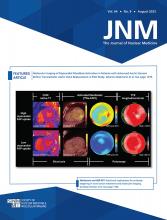REPLY: We are grateful for the commentary on our paper (1) by Ah-Thiane et al. and appreciate the reference to their publication on prostate-specific membrane antigen (PSMA) radioligand uptake by axillary lymph nodes after vaccination. We submitted the final version of our manuscript to The Journal of Nuclear Medicine on February 17, 2022, and their study was published in July 2022 (2). Therefore, we were unfortunately unable to discuss the study by Ah-Thiane et al.
It is interesting that Ah-Thiane et al. reported a substantially lower incidence of PSMA-positive axillary lymph nodes with 68Ga-PSMA-11 (12%) than we found for 18F-rhPSMA 7.3 (45%). This large difference may indeed point to differences in the studied population or of the radiopharmaceutical itself, but confirmation will require future studies.
We also thank Ah-Thiane et al. for pointing out that PSMA expression during angiogenesis may contribute to PSMA expression after vaccination. We had discussed that PSMA expression is not specific to the prostate and that PSMA RNA is found in many tissues, including lymph nodes (3,4). At the moment, there are, to our knowledge, no data to allow for definitive statements on what precisely causes PSMA radioligand uptake after vaccination.
It is well conceivable that different vaccines or vaccine dosages cause different degrees of PSMA radioligand uptake. Unfortunately, information on the vaccine type was not available for all patients in this retrospective study. However, we assume that most patients received the Pfizer-BioNTech vaccine, which was the most commonly used coronavirus disease 2019 vaccine in Germany.
With respect to the clinical consequences of PSMA radioligand uptake in axillary lymph nodes, it is important to remember that the axilla is an uncommon site of metastatic disease in prostate cancer patients. Axillary lymph nodes may be involved in advanced stages of prostate cancer, but in this setting, the presence or absence of metastases in the axilla will only rarely affect therapeutic decisions. In such cases, we believe that histologic confirmation will be required to differentiate between inflammatory and metastatic nodes because we are not aware of alternative radiotracers that are similar to PSMA ligands in sensitivity for prostate cancer metastases but have a substantially higher specificity. As pointed out by Ah-Thiane et al., the main message of our paper is that PSMA is not specific for prostate cancer and that substantial PSMA radioligand uptake may be observed in activated lymph nodes. We hope that our study stimulates future research in this area, which will be important to understand the strengths and limitations of PSMA PET imaging in the clinic. A particularly intriguing question is perhaps why the specificity of PSMA PET/CT for pelvic lymph node metastases has been extremely high in almost all studies, despite the fact that inflammatory nodes in the axilla can show such high uptake of PSMA radioligands.
Susan Notohamiprodjo*, Matthias Eiber, Christian Lohrmann, Wolfgang A. Weber
*Technical University of Munich, Munich, Germany
E-mail: s.notohamiprodjo{at}tum.de
Footnotes
Published online Jun. 22, 2023.
- © 2023 by the Society of Nuclear Medicine and Molecular Imaging.
- Received for publication May 16, 2023.
- Revision received May 31, 2023.







